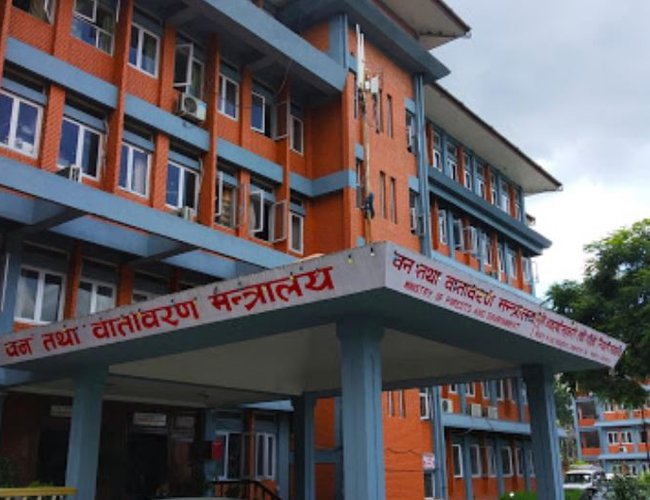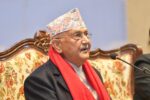KATHMANDU: The World Environment Day (June 5) this year is preceded by some remarkable events bearing environmental significance in Nepal.
The Supreme Court delivered a verdict to stop the construction of Nijgadh International Airport in Bara, a district in the southern plains of the country, as the country successfully conducted the local level elections which witnessed emergence of some independent candidates- the phenoms advocating environmental issues.
Going further, other important days preceded with the World Environment Day are the Sagarmatha Day (May 29), and the World Bicycling Day (June 3), which also warrants concern and interest around environmental issues.
These days can be taken as the moments to create enabling atmosphere for advocacy of environment protection while June 5 is evidently the major day to review the past efforts on it and make plans for the days ahead.
Particularizing the similar events, the first meeting of the people’s representatives in the Kathmandu Metropolitan City (KMC) witnessed intense discussion relating to the problems of waste management.
The meeting aired live with the first decision of Mayor Balendra Shah was applauded much because it had come against cagey bureaucracy, which loves opaque business.
Thousands of people keenly listened to the views of the newly elected ones.
Meanwhile, the Kathmanduities plagued by the recurring problem of garbage have been excited over the discussion on pressing environmental issues.
However, how Balendra gets cooperation from concerned sides decides the early or later solution of one of the nagging problems of Kathmandu Valley, the waste management.
Coordination with line ministry, cooperation with other local levels and administration, support from his team within KMC, and from political parties is imperative to clean the Kathmandu.
Although other cities and urban areas across the country are facing new challenges of environmental protection, Kathmandu Valley evidently deserves priority for debate and discussion because it is the federal capital with most sordid state of environment.
Varieties of pollutions exist in the Kathmandu Valley, posing risk to biodiversity.
Already afflicted with rancidity emanating from the piles of garbage in different places, especially along the river corridors, and intersections of roads, the polluted rivers are reeking to depict urban decadence and environmental degradation. It is manifestation of ugly urban planning in Nepal.
By the way, what about the government decision of building four smart cities in the four corners of Kathmandu Valley?
Needless to say, we are smart in making decisions and policies but laggard in timely and effective implementations.
Talking about the policy documents, it was good to see the environment protection and climate changes issues mentioned with priority in the manifestos of political parties before the local elections.
Similarly, while contesting within the party in the general conventions and national congress, even the political leaders of big parties-
Nepali Congress, CPN UML, and CPN (Maoist Centre), prioritized the climate change and environment protection.
But, have anyone found that their written texts have changed into behaviour of political parties and leaders?
If they do not turn words into practice, how can they deliver well to protect environment?
Another glaring example of pollution in Nepal is the Sagarmatha region. It is worrying that even the pristine snow-clad region of the Sagarmatha, world’s highest peak, has piles of garbage.
Trashes at Sagarmatha have been the national and international media headlines for some years.
On June 6, 2019, the Washington Post ran a story, ‘Mount Everest is full of garbage.
A cleanup crew just hauled off 24,000 pounds of waste’. The story written by Mr Kyle Swenson mentioned, “The world’s most famous peak is showing its wear and tear. … Each spring, hundreds of people flock to the slopes of the nearly 30,000-foot mountain. The problem is what they leave behind- tons of garbage and human waste that have earned the natural wonder distinction as the “world’s highest garbage dump.”‘
Similarly, on April 24, 2021, Alton Byers wrote about the garbage problem at Sagarmatha, “The accumulation of solid waste in the world’s high mountain camping sites, base camps, and high camps has been a chronic problem facing alpine ecosystems since mountaineering first became popular in the 1850s. The problem has further intensified with the steady acceleration of trekking and mountaineering tourism in the past four decades.”
Currently, fierce discussion is going on for and against the SC verdict on construction of Nijgadh International Airport.
While participating in the discussion on appropriation bill in the parliament, even the ruling political party leaders decried the SC decision while opposition went further to castigate it.
A section of conservationists and environmentalists has welcomed the decision.
Groups of young environmentalists have paraded with placards reading, ‘SC saved Nijgadh forest.’ Nevertheless, the verdict is to spur again the debate whether it is the environment first or development.
However, the country has no option but to focus balanced approach to environmental protection and development activities.
With this in the background, an environmental expert was asked how the World Environment Day should be observed and how he had taken Nepal’s approach to environmental protection.
Expert Dr Ngamindra Dahal said, “Protection of environment needs collective sense and efforts. Environmental degradation is a global problem posing severe threat to ideal state of co-existence and biodiversity. But, it is worrying that development activities have been understood as destruction of environment.” He further blames that policy makers and politicos strongly believe that environment must be breached to forward development.
“The Environment Day must not be limited to the day to make sweet slogans. Chanting slogans is mere lip service.”
Dr Dahal wonders why we do not make everyday an environment protection day.
As the expert suggests it is high time Nepalis made serious review of past policies and activities and change individual to State behaviour to protect environment.
Timely intervention is essential to not federalize the mismanagement of environment facing the federal capital, Kathmandu.
RSS









Comment